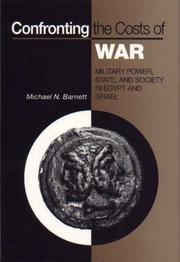| Listing 1 - 4 of 4 |
Sort by
|

ISBN: 0231109199 Year: 1998 Publisher: New York (N.Y.): Columbia university press
Abstract | Keywords | Export | Availability | Bookmark
 Loading...
Loading...Choose an application
- Reference Manager
- EndNote
- RefWorks (Direct export to RefWorks)
Pan-Arabism --- Panarabism --- Panarabisme --- 812 Ideologie --- 815 Geschiedenis --- 821.1 Volkenrecht --- 841 Politiek Bestel --- 846 Identiteit --- 846.1 Etniciteit --- 850 Vrede- en conflictstudies --- 883.4 West-Azië --- Nationalism --- -Consciousness, National --- Identity, National --- National consciousness --- National identity --- International relations --- Patriotism --- Political science --- Autonomy and independence movements --- Internationalism --- Political messianism --- Arabism --- Panislamism --- Arab cooperation --- Arab countries --- -Arab countries --- -Arab world --- Arabic countries --- Arabic-speaking states --- Islamic countries --- Middle East --- Politics and government --- Foreign relations --- -Politics and government --- -Pan-Arabism --- Consciousness, National --- Foreign relations. --- Politics and government.

ISBN: 0691078831 0691000956 9786612751578 1282751573 1400820707 1400810906 9781400820702 9781400810901 9780691078830 9780691000954 9781282751576 6612751576 1400815029 Year: 2012 Publisher: Princeton, NJ
Abstract | Keywords | Export | Availability | Bookmark
 Loading...
Loading...Choose an application
- Reference Manager
- EndNote
- RefWorks (Direct export to RefWorks)
What determines the strategies by which a state mobilizes resources for war? And does war preparation strengthen or weaken the state in relation to society? In addressing these questions, Michael Barnett develops a novel theoretical framework that traces the connection between war preparation and changes in state-society relations, and applies that framework to Egypt from 1952 to 1977 and Israel from 1948 through 1977. Confronting the Costs of War addresses major issues in international relations, comparative politics, and Middle Eastern studies.
Civil-military relations --- Relations pouvoir civil-pouvoir militaire --- History --- Egypt --- Israel --- Israël --- Egypte --- Military policy. --- Politics and government. --- Politics and government --- Politique militaire --- Politique et gouvernement --- 810 Theorie en Methode --- 830 Economie --- 836 (Multi-)nationale ondernemingen --- 837 Financiën en Bankwezen --- 841 Politiek Bestel --- 842 Media --- 850 Vrede- en conflictstudies --- 855 Oorlogsvoering --- 870 Defensie en Wapens --- 881.3 Noord-Afrika --- 883.4 West-Azië --- Civil-military relations. --- Israël --- Military and civilian power --- Military-civil relations --- Ägypten --- Egitto --- Egipet --- Egiptos --- Miṣr --- Southern Region (United Arab Republic) --- Egyptian Region (United Arab Republic) --- Iqlīm al-Janūbī (United Arab Republic) --- Egyptian Territory (United Arab Republic) --- Egipat --- Arab Republic of Egypt --- A.R.E. --- ARE (Arab Republic of Egypt) --- Jumhūrīyat Miṣr al-ʻArabīyah --- Mitsrayim --- Egipt --- Ijiptʻŭ --- Misri --- Ancient Egypt --- Gouvernement royal égyptien --- Executive power --- Sociology, Military --- Military government --- Égypte --- جمهورية مصر العربية --- مِصر --- مَصر --- Maṣr --- Khēmi --- エジプト --- Ejiputo --- Egypti --- Egypten --- מצרים --- United Arab Republic --- Arab Cold War. --- Arab–Israeli conflict. --- Arms industry. --- Austerity. --- Authoritarianism. --- Bourgeoisie. --- Capitalism. --- Colonialism. --- Comparative politics. --- Conscription. --- Correlates of War. --- Counter-insurgency. --- Criticisms of socialism. --- David Ben-Gurion. --- Domestic policy. --- Economic development. --- Economic growth. --- Economic nationalism. --- Economic policy. --- Economic power. --- Economic problem. --- Economics. --- Economy. --- Egyptian Government. --- Embargo. --- External debt. --- Failed state. --- Foreign policy. --- Great power. --- Hard currency. --- High politics. --- Histadrut. --- Hostility. --- Ideology. --- Imperialism. --- Industrialisation. --- International relations. --- Israelis. --- Liberalization. --- Mapai. --- Marxism. --- Militarism. --- Militarization. --- Military Keynesianism. --- Military service. --- Military strategy. --- Military threat. --- Military–industrial complex. --- National security. --- Nationalization. --- Neocolonialism. --- Neorealism (international relations). --- On War. --- Origins of the Cold War. --- Overproduction. --- Policy. --- Political Order in Changing Societies. --- Political alienation. --- Political economy. --- Politics Among Nations. --- Politics. --- Populism. --- Power politics. --- Private sector. --- Public expenditure. --- Public sector. --- Radicalism (historical). --- Radicalization. --- Realigning election. --- Realism (international relations). --- Requirement. --- Right-wing politics. --- Security dilemma. --- Security studies. --- Shortage. --- Soviet Union. --- State (polity). --- State formation. --- States and Social Revolutions. --- Strategic goal (military). --- Strategy. --- Tariff. --- Tax. --- Theory of International Politics. --- Third World. --- Total war. --- Trade barrier. --- Undue hardship. --- War bond. --- War economy. --- War effort. --- War of Attrition. --- War studies. --- War. --- Warfare. --- World Politics. --- World War I. --- World War II. --- Yom Kippur War. --- Zionism.
Book
ISBN: 9780415776325 9780415776318 0415776317 0415776325 9780203862971 9781135190514 9781135190552 9781135190569 Year: 2010 Publisher: London : Routledge,
Abstract | Keywords | Export | Availability | Bookmark
 Loading...
Loading...Choose an application
- Reference Manager
- EndNote
- RefWorks (Direct export to RefWorks)
Humanitarian intervention. --- International relief. --- Security, International. --- World politics --- Forced migration. --- Forced migration --- Humanitarian intervention --- International relief --- Security, International --- 814 Theorie van de internationale betrekkingen --- 822.1 Verenigde Naties --- 856.6 Vredesopbouw --- Collective security --- International security --- International relations --- Disarmament --- International organization --- Peace --- Grants-in-aid, International --- International grants-in-aid --- Relief, International --- Relief (Aid) --- Charities --- Economic assistance --- Public welfare --- Intervention (International law) --- Cleansing, Ethnic --- Compulsory resettlement --- Ethnic cleansing --- Ethnic purification --- Involuntary resettlement --- Migration, Forced --- Purification, Ethnic --- Relocation, Forced --- Resettlement, Involuntary --- Migration, Internal --- Droit d'ingérence humanitaire --- Secours international --- Sécurité internationale --- Relations internationales --- Transferts de population --- Nations Unies. Haut commissariat pour les réfugiés --- Nations Unies. Conseil de sécurité --- Intervention (droit international) --- Souveraineté --- Reconstruction de l'État --- 21e siècle --- Rwanda --- 1989-.... --- 1990-.... --- Population
Book
Year: 2021 Publisher: Cambridge, UK ; New York, NY : Cambridge University Press,
Abstract | Keywords | Export | Availability | Bookmark
 Loading...
Loading...Choose an application
- Reference Manager
- EndNote
- RefWorks (Direct export to RefWorks)
"The Social Trends Institute (STI) is a non-profit international research center dedicated to fostering understanding of globally significant social trends. To this end, STI brings together the world's leading thinkers, taking an interdisciplinary and international approach. Currently, STI's areas of priority study are Family, Bioethics, Culture & Lifestyles, Governance, and Civil Society. Findings are disseminated to the media and through scholarly publications. The individuals and institutions that support STI share a conception of society and the individual that commands a deep respect for the equal dignity of human beings, and for freedom of thought, as well as a strong desire to contribute to social progress and the common good"-- Provided by publisher.
International organization. --- International relations. --- Globalization --- Political aspects.
| Listing 1 - 4 of 4 |
Sort by
|

 Search
Search Feedback
Feedback About UniCat
About UniCat  Help
Help News
News